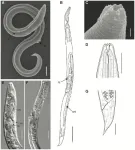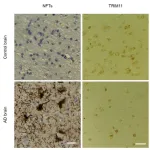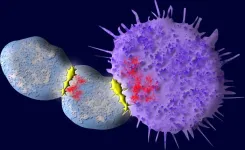(Press-News.org) New research shows the importance of long-term commitment to the MIND diet for reaping the greatest benefit to brain health.
“The benefits within the new study’s three-year clinical trial weren’t as impressive as we’ve seen with the MIND diet observational studies in the past, but there were improvements in cognition in the short-term, consistent with the longer-term observational data,” said lead study author Lisa Barnes, PhD, associate director of the Alzheimer’s Disease Research Center at RUSH.
Results from the study, published in The New England Journal of Medicine, showed that within a three-year period, there was no significant statistical difference in change in cognition for participants in the MIND diet group compared to the usual diet control group; both groups were coached to reduce calories by 250 kilocalories per day. But there was a significant improvement during the first two years of the study.
“What we saw was improvement in cognition in both groups, but the MIND diet intervention group had a slightly better improvement in cognition, although not significantly better,” Barnes said. “Both groups lost approximately 5 kilograms over three years, suggesting that it could have been weight loss that benefited cognition in this trial.”
'Exciting' improvement
This is the first randomized clinical trial designed to test the effects of a diet thought to be protective for brain health, on the decline of cognitive abilities among a large group of individuals 65 years or older who did not have cognitive impairment. The MIND diet has been ranked among the top five diets by U.S. News & World Report annually for the last six years.
“There is established research that shows that a person’s diet affects health,” Barnes said. “The participants in this study had to have sub-optimal diets as determined by a score of 8 or less on a diet screening instrument before the study even began. It is reasonable to think that either they were going to maintain their cognition or decrease the rate of cognitive decline in the future.”
“It was exciting to see that there was improvement in cognition over the first year or so, but it could have been due to practice effects on the cognitive tests, and we saw it for the control diet as well, which focused on just caloric restriction.”
Previous research by the late Martha Clare Morris, ScD, showed that there was a slower rate of decline among those who ate specific foods. Morris was a nutritional epidemiologist at RUSH and the original principal investigator of the MIND diet study that was funded by a $14.5 million National Institutes of Health grant and involved two clinical sites, RUSH in Chicago and Harvard School of Public Health in Boston.
In 2015, Morris and her colleagues at RUSH and Harvard University developed the MIND diet — which is short for Mediterranean-DASH Intervention for Neurodegenerative Delay — in preparation for the trial. The diet is based on the most compelling research on the foods and nutrients that affect brain health. As the name suggests, the MIND diet is a hybrid of the Mediterranean and DASH (Dietary Approaches to Stop Hypertension) diets. Both diets have been found to reduce the risk of cardiovascular conditions, such as hypertension, diabetes, heart attack and stroke. In two studies published in 2015, Morris and colleagues found that the MIND diet could slow cognitive decline and lower a person’s risk of developing Alzheimer’s disease significantly, even if the diet was not followed meticulously.
Study tracked 604 participants over three years
The latest trial of the MIND Diet for Prevention of Cognitive Decline in Older Persons, was a randomized, Phase III trial that enrolled 604 people who were overweight and had a suboptimal diet and a family history of Alzheimer’s disease. The trial compared two different diet interventions, both of which included dietary counseling with mild calorie restriction of 250 calories per day for weight loss.
Participants of both groups had individualized diet guidelines developed by dietitians, and they received regular phone and in-person consultations, as well as occasional group sessions over the three-year life of the study. Participants were seen five times during the three years to evaluate their mental abilities, blood pressure, diet, physical activity, health conditions and medication use.
“Both groups of participants got a lot of support and accountability by trained registered dietitians,” said Jennifer Ventrelle, assistant professor in the Departments of Preventive Medicine and Clinical Nutrition and lead dietitian on the MIND diet trial at RUSH.
“The good news is that this helped all participants improve on average, but unfortunately hindered the ability to detect significant differences between the two groups in this relatively short period of time. Current and future research plans to look at people coached to follow the diet in this format compared to individuals following a usual diet in a format closer to usual care such as brief clinical encounters or a self-guided program with less support.”
“By the end of the study, the average weight loss was approximately 5.5% of initial body weight for all participants, exceeding the study target of 3%, the amount recognized as clinically significant to prevent or improve adverse health outcomes,” Ventrelle said.
“The average MIND score at the end of three years for the MIND group was 11.0 and 8.3 for the control group, placing both groups in a therapeutic range to slow cognitive decline and lower a risk for Alzheimer’s disease, according to previous studies. The significant weight loss and improved MIND scores suggest that the control group also improved their diet and may suggest that following the MIND diet at a score of at least 8.3, coupled with at least a 250 calorie reduction to produce weight loss, may improve cognition. More research is needed to confirm this.”
Fish, chicken, berries, nuts and leafy greens
The MIND diet has 14 dietary components, including nine “brain-healthy food groups” – such as chicken and fish, green leafy vegetables and berries, and nuts – and five unhealthy groups: red meat, butter and stick margarine, full fat cheese, pastries and sweets, and fried foods.
“Randomized trials are gold standards for establishing a cause-and-effect relationship between diet and incidence of Alzheimer’s disease,” Barnes said.
“These individuals were healthy at the start of the trial and had no cognitive impairment, and their cognition got slightly better over time,” Barnes said. “Why there was no difference between the two diet groups at the end of the trial could be a result of many factors including that the control group had a relatively healthy diet. Moving forward, we will look at specific food groups and their associations with biomarkers that were measured in the blood to see if certain nutrients and food groups are more important than others since the two groups were pretty healthy from a dietary perspective at the start.”
END
MIND diet study shows 'short-term' impact on cognition
Diet developed at RUSH believed to help maintain brain health
2023-07-27
ELSE PRESS RELEASES FROM THIS DATE:
Race/ethnicity isn't associated with unplanned hospitalizations after breast reconstruction
2023-07-27
July 27, 2023 – Race/ethnicity is not an independent predictor of hospital readmission in patients undergoing breast reconstruction surgery, reports a study in the August issue of Plastic and Reconstructive Surgery®, the official medical journal of the American Society of Plastic Surgeons (ASPS). The journal is published in the Lippincott portfolio by Wolters Kluwer.
Among patients who have unplanned hospitalizations after breast reconstruction, costs are substantially higher for Black or Hispanic patients, according to the new research by ASPS ...
Nematode resurrected from Siberian permafrost laid dormant for 46,000 years
2023-07-27
A soil nematode reanimated from Siberian permafrost had laid dormant for approximately 46,000 years, according to a study publishing July 27, 2023 in the open access journal PLOS Genetics by Anastasia Shatilovich at the Institute of Physicochemical and Biological Problems in Soil Science RAS in Russia, Vamshidhar Gade at the Max Planck Institute for Molecular Cell Biology and Genetics in Germany, and colleagues.
Some animals, such as tardigrades, rotifers, and nematodes, can survive harsh conditions by entering a dormant state known as “cryptobiosis”. Previously, nematode individuals were reanimated from samples collected from a fossilized burrow in silt deposits ...
New insights into the origin of the Indo-European languages
2023-07-27
For over two hundred years, the origin of the Indo-European languages has been disputed. Two main theories have recently dominated this debate: the ‘Steppe’ hypothesis, which proposes an origin in the Pontic-Caspian Steppe around 6000 years ago, and the ‘Anatolian’ or ‘farming’ hypothesis, suggesting an older origin tied to early agriculture around 9000 years ago. Previous phylogenetic analyses of Indo-European languages have come to conflicting conclusions about the age of the family, due to the combined effects of inaccuracies and inconsistencies in the datasets they used and limitations in the way that phylogenetic methods analyzed ...
Genome analysis of 46,000-year-old roundworm from Siberian permafrost reveals novel species
2023-07-27
Some organisms, such as tardigrades, rotifers, and nematodes, can survive harsh conditions by entering a dormant state known as “cryptobiosis.” In 2018, researchers from the Institute of Physicochemical and Biological Problems in Soil Science RAS in Russia found two roundworms (nematode) species in the Siberian Permafrost. Radiocarbon dating indicated that the nematode individuals have remained in cryptobiosis since the late Pleistocene, about 46,000 years ago. Researchers from the Max Planck Institute of Molecular Cell Biology and Genetics (MPI-CBG) in ...
Tau-regulating protein identified as a promising target for developing Alzheimer’s disease treatment
2023-07-27
PHILADELPHIA – A gene encoding a protein linked to tau production—tripartite motif protein 11 (TRIM11)—was found to suppress deterioration in small animal models of neurodegenerative diseases similar to Alzheimer’s disease (AD), while improving cognitive and motor abilities, according to new research from the Perelman School of Medicine at the University of Pennsylvania. Additionally, TRIM11 was identified as playing a key role in removing the protein tangles that cause neurodegenerative diseases, like AD. The findings are published today in Science. ...
A unified theory of the lexicon and the mind: Researchers find common cognitive foundation for child language development and language evolution
2023-07-27
Cognitive and computer scientists at the University of Toronto, Universitat Pompeu Fabra and the Catalan Institution for Research and Advanced Studies have found child language development and the historical evolution of the world’s languages share a common cognitive foundation—a core knowledge base where patterns of children’s language innovation can predict patterns of language evolution, and vice versa.
Published today in Science, the paper is a first-of-its-kind step toward a unified theory of the lexicon and the mind examined across timescales. The result may also help predict how a word’s meaning may change ...
Exposure to like-minded sources on Facebook is prevalent but did not increase polarization during the 2020 U.S. election
2023-07-27
People often debate whether social media creates "echo chambers" by showing users content that matches their politics and in turn increases polarization. A new study published today in the journal Nature reports that reducing Facebook users' exposure to content from politically "like-minded" sources had no measurable effect on their political beliefs or attitudes during the 2020 U.S. presidential election.
The findings are part of a broader research project examining the role of ...
From Down Under to Underground: surprising daddy long-legs spiders discovered in Australia and Réunion
2023-07-27
Australia’s rich and diverse fauna never fails to surprise us, as a new spider species has been documented from the continent.
The novel species, a blind daddy long-legs, was found in boreholes in the arid Pilbara of Western Australia. It is the first cave-adapted daddy long-legs spider reported from the continent, with other blind species of its genus so far only found in Thailand, Laos, and Vietnam.
“It represents a subfamily that was previously thought to be restricted to the tropical north and east of the continent,” says Bernhard Huber, one of the authors of a recent study published ...
Geological Society of America announces 2023–2024 Fellows for Science Policy and Communication
2023-07-27
27 July 2023
Geological Society of America
Release No. 23-28
Contact: Justin Samuel
+1-303-357-1026
jsamuel@geosociety.org
Boulder, Colo., USA: GSA is pleased to welcome three exceptional new Fellows who will join us in our mission to advance geoscience knowledge and discovery through excellent writing, research, and advocacy.
GSA’s 2023–2024 Science Communication Fellow is Arianna Soldati.
Soldati is an assistant professor of volcanology at North Carolina State University. Her lab group works on a variety of topics, ranging from effusive eruptions to critical minerals. She received her Ph.D. in geological sciences from the University of ...
Tail spin: Study reveals new way to reduce friendly fire in cell therapy
2023-07-27
New Haven, Conn. — In a promising form of immunotherapy known as CAR T-cell (chimeric antigen receptor) therapy, the patient’s T cells are engineered to better recognize and attack antigens on the surface of cancer cells. In treatments currently approved for use in battling lymphoma and leukemia, however, the therapy has a drawback: Amidst the cancer-killing frenzy, many engineered T cells become tainted with the remnants of cancer antigens, which causes them to turn on other T cells. This eventually depletes the body of cancer-fighting cells ...
LAST 30 PRESS RELEASES:
Iron deficiency blocks the growth of young pancreatic cells
Selective forest thinning in the eastern Cascades supports both snowpack and wildfire resilience
A sea of light: HETDEX astronomers reveal hidden structures in the young universe
Some young gamers may be at higher risk of mental health problems, but family and school support can help
Reduce rust by dumping your wok twice, and other kitchen tips
High-fat diet accelerates breast cancer tumor growth and invasion
Leveraging AI models, neuroscientists parse canary songs to better understand human speech
Ultraprocessed food consumption and behavioral outcomes in Canadian children
The ISSCR honors Dr. Kyle M. Loh with the 2026 Early Career Impact Award for Transformative Advances in Stem Cell Biology
The ISSCR honors Alexander Meissner with the 2026 ISSCR Momentum Award for exceptional work in developmental and stem cell epigenetics
The ISSCR honors stem cell COREdinates and CorEUstem with the 2026 ISSCR Public Service Award
Minimally invasive procedure effectively treats small kidney cancers
SwRI earns CMMC Level 2 cybersecurity certification
Doctors and nurses believe their own substance use affects patients
Life forms can planet hop on asteroid debris – and survive
Sylvia Hurtado voted AERA President-Elect; key members elected to AERA Council
Mount Sinai and King Saud University Medical City forge a three-year collaboration to advance precision medicine in familial inflammatory bowel disease
AI biases can influence people’s perception of history
Prenatal opioid exposure and well-being through adolescence
Big and small dogs both impact indoor air quality, just differently
Wearing a weighted vest to strengthen bones? Make sure you’re moving
Microbe survives the pressures of impact-induced ejection from Mars
Asteroid samples offer new insights into conditions when the solar system formed
Fecal transplants from older mice significantly improve ovarian function and fertility in younger mice
Delight for diastereomer production: A novel strategy for organic chemistry
Permafrost is key to carbon storage. That makes northern wildfires even more dangerous
Hairdressers could be a secret weapon in tackling climate change, new research finds
Genetic risk for mental illness is far less disorder-specific than clinicians have assumed, massive Swedish study reveals
A therapeutic target that would curb the spread of coronaviruses has been identified
Modern twist on wildfire management methods found also to have a bonus feature that protects water supplies
[Press-News.org] MIND diet study shows 'short-term' impact on cognitionDiet developed at RUSH believed to help maintain brain health






